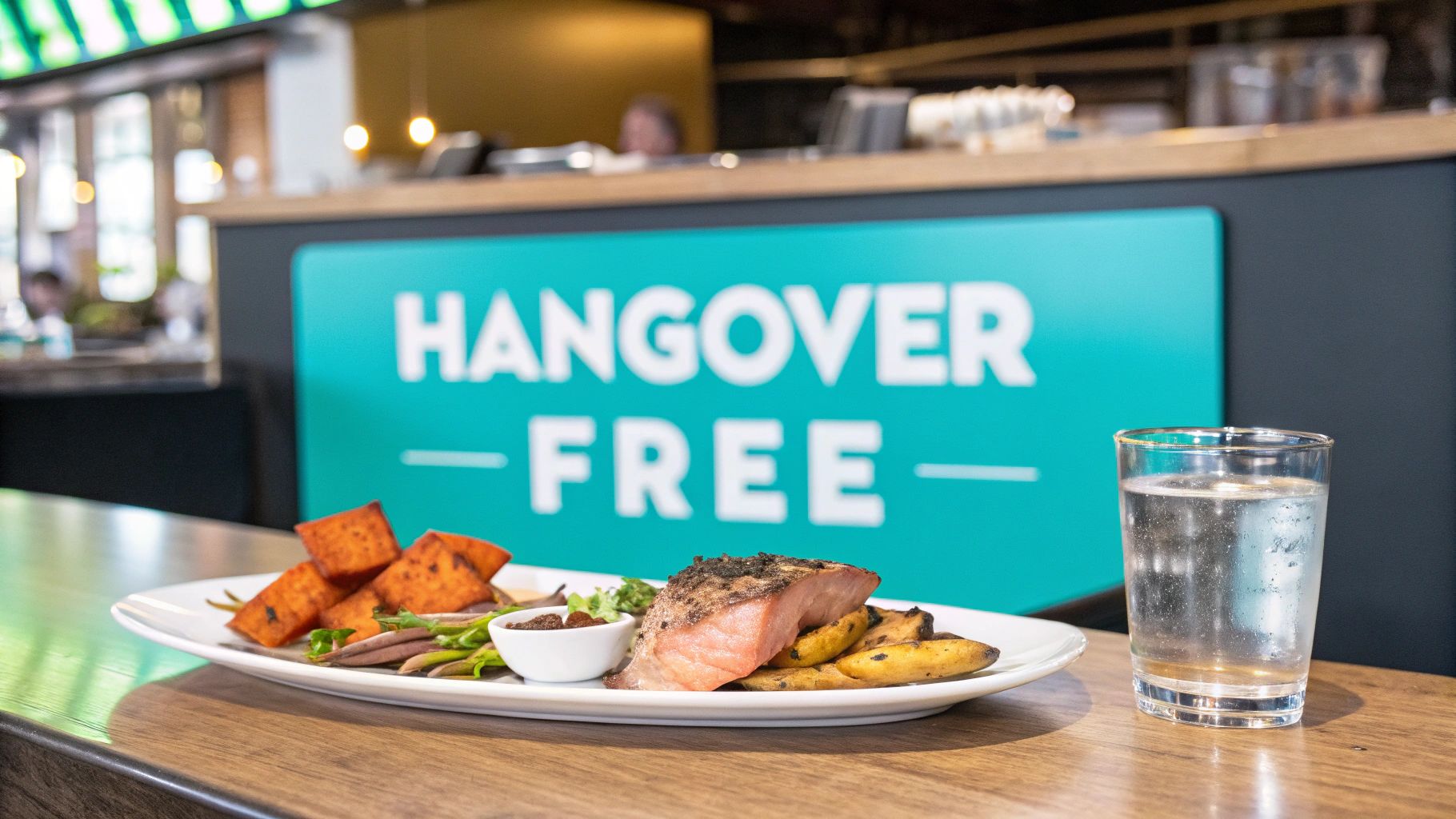

· By Annemarie
How to Avoid Hangover After Drinking: Tips for a Smoother Morning
We’ve all been there. You have a great night out, only to wake up feeling like you’ve been hit by a truck. But what if I told you the secret to a better morning isn't some magic pill you take after the damage is done?
The real key is being proactive. It's about getting ahead of the hangover instead of just reacting to the headache, nausea, and regret. Think of it as setting your body up for success before you even take that first sip.
Your Proactive Plan for Preventing Hangovers
Honestly, the best approach is surprisingly simple. It’s not about some complicated, restrictive routine. It’s about building a solid defense for your body by focusing on three core pillars: hydration, nutrition, and pacing.
Mastering these three areas can completely change your relationship with alcohol, allowing you to enjoy the night and the next day. Each one tackles a different way alcohol messes with your system, and together, they form a powerful shield against the worst of its effects.
The Three Pillars of Prevention
Your game plan needs to be easy enough to remember, even a few drinks in. The idea is to turn these steps into second nature, not a list of chores.
- Hydration: Alcohol is a diuretic. In simple terms, it makes you pee more, which quickly leads to dehydration. That dehydration is a huge reason you get headaches, feel exhausted, and have a mouth as dry as the Sahara.
- Nutrition: Ever notice how alcohol hits you harder on an empty stomach? That’s because it absorbs directly and rapidly into your bloodstream, slamming your liver all at once. A good meal acts like a crucial buffer.
- Pacing: Your liver is a workhorse, but it has its limits. It can only process about one standard drink per hour. When you drink faster than that, you get a traffic jam of toxins that your body just can't handle.
This isn’t about limiting your fun—it’s about making sure the fun doesn’t end when you wake up the next morning. In fact, research shows that up to 80% of hangover symptoms are tied directly to dehydration and the electrolyte imbalances that come with it. Just tackling that one factor gives you a huge advantage. If you're curious about the growing market for hangover relief, this Grand View Research report is a fascinating read.
The smartest way to beat a hangover is to never let your body fall behind in the first place. Stay on top of your hydration and nutrition from the start, and you’ll give yourself a massive head start.
To make this even easier, I've put together a quick cheat sheet. Think of it as your mental checklist before you head out for the night.
Core Pillars of Hangover Prevention
Here's a breakdown of the three core strategies. Keep these in mind, and you’ll be in much better shape.
| Strategy | Why It Works | Actionable Tip |
|---|---|---|
| Hydration | Fights the diuretic effect of alcohol that causes dehydration. | For every alcoholic drink, have one glass of water. |
| Nutrition | Slows down how fast alcohol gets into your bloodstream. | Eat a meal with a good mix of healthy fats, protein, and complex carbs. |
| Pacing | Keeps your liver from getting overwhelmed by alcohol. | Stick to about one standard drink per hour. |
By building your night around these three simple ideas, you're not just preventing a hangover; you're choosing to have a better overall experience. It's the difference between a night you'll regret and one you'll remember fondly.
The Science of Hydration and Why Water Is Key
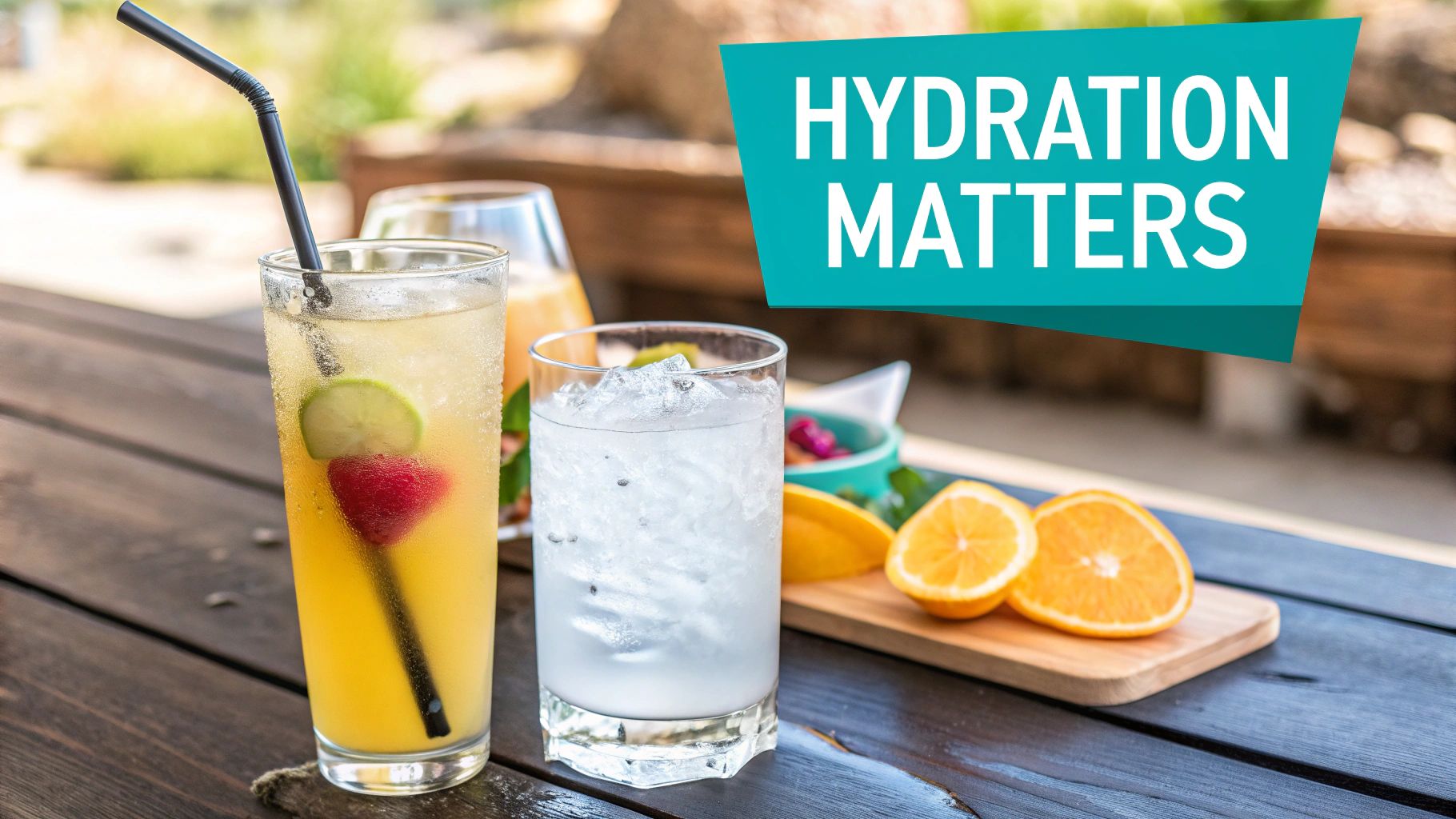
Ask anyone for their number one hangover tip, and you'll almost always hear the same thing: "Drink more water." It sounds almost too simple, but this advice is grounded in solid science and is, without a doubt, one of the most effective moves you can make.
So, what's really going on? Alcohol is a diuretic. In simple terms, it tells your kidneys to flush water straight to your bladder instead of letting your body reabsorb it. This is exactly why a night of drinking involves so many trips to the bathroom. With each trip, your body loses vital fluids, marching you straight toward dehydration.
That pounding headache, the dizziness, and that desert-like thirst the next morning? Those are all the classic, tell-tale signs of your body and brain crying out for water.
Your Practical Hydration Schedule
Knowing you should drink water is easy. Actually remembering to do it after a couple of cocktails is a different story. A fuzzy plan to "drink more water" often gets lost in the fun. The trick is to have a simple, repeatable game plan that becomes second nature.
Here’s a realistic schedule you can actually stick to:
- Front-Load Your Hydration: Kick things off by drinking a full glass of water before you even touch your first alcoholic drink. This gets you ahead of the game, starting the night fully hydrated instead of constantly trying to play catch-up.
- Live by the "One-for-One" Rule: This is the gold standard of responsible drinking for a reason. For every beer, cocktail, or glass of wine, follow it with a glass of water. It's a foolproof way to pace yourself and continuously replace the fluids you're losing.
- Your End-of-Night Chaser: Before you hit the pillow, drink one more big glass of water. This final boost helps your body rehydrate while you sleep, making a world of difference for how you feel when your alarm goes off.
Don't sleep on the power of pacing. Just ordering water at the same time as your drink makes it easy to alternate sips. You’ll naturally slow down your alcohol consumption and keep dehydration away without it feeling like a chore.
Why Water Alone Isn't Always Enough
While water is non-negotiable, chugging plain H2O isn't always the full solution, especially after a particularly long night out. When you're sweating and urinating more, you're not just losing water—you're also flushing out critical electrolytes.
Electrolytes are essential minerals like sodium, potassium, and magnesium that do a ton of heavy lifting for your body. They help with nerve function, muscle contractions, and keeping your fluid levels balanced. When these get depleted, you feel it. That fatigue, weakness, and even muscle cramps that amplify a hangover? That's often a sign of an electrolyte imbalance. You can find even more top tips to prevent hangovers in 2025 to round out your full strategy.
This is exactly where something more targeted comes into play. An Upside Hangover Stick, for instance, is designed not just to hydrate but to actively replenish those lost minerals. It helps your body get back to its natural equilibrium much more efficiently than water can on its own. By pairing a smart water plan with an electrolyte boost, you’re giving your body the full toolkit it needs to process the alcohol and help you wake up feeling like yourself.
Strategic Eating Before and During Your Night Out
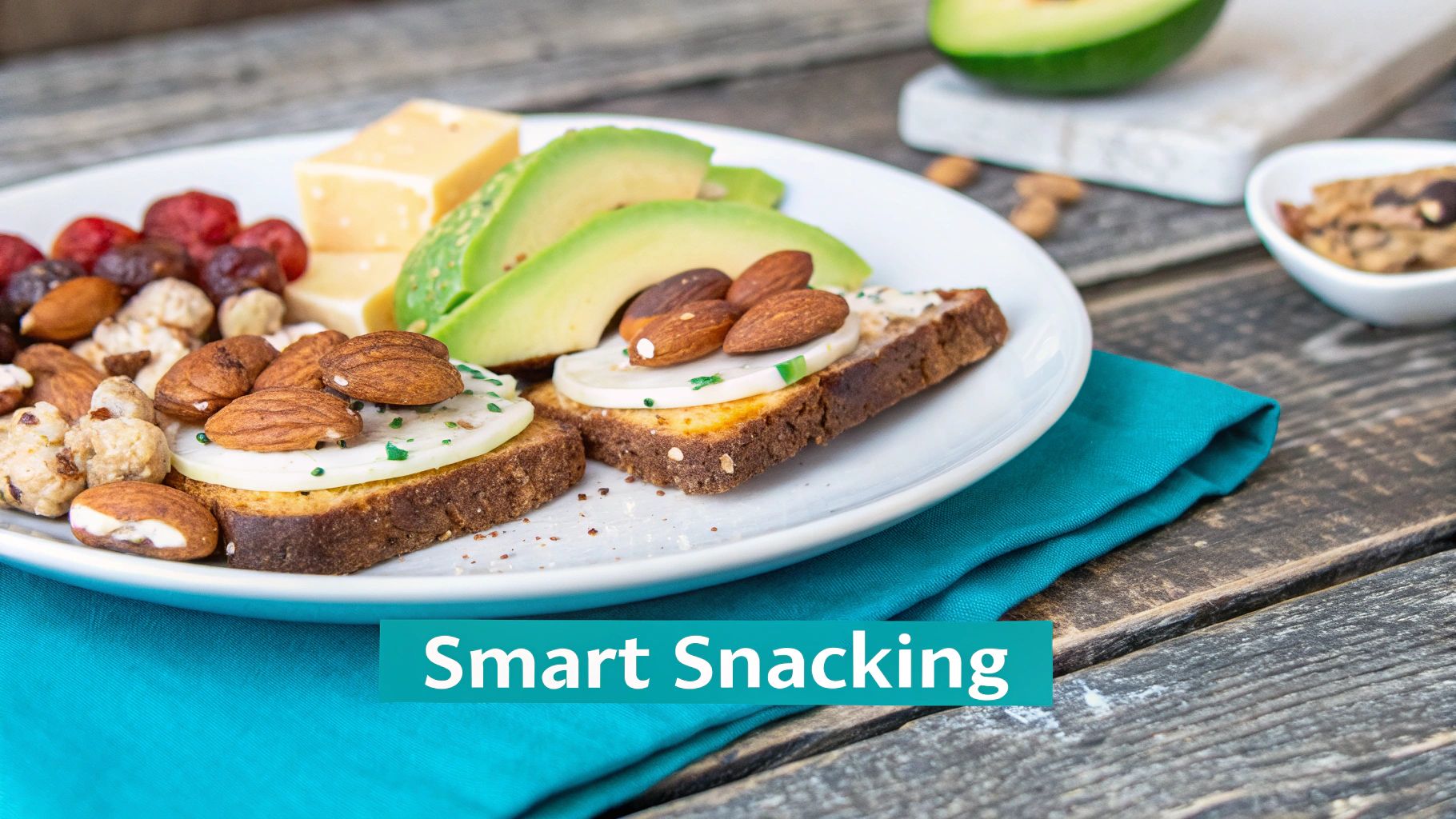
We’ve all heard it a thousand times: don't drink on an empty stomach. It's the golden rule for a reason. But what most people don't realize is that what you eat is just as crucial as the fact that you're eating at all.
Think of your pre-drinking meal as laying the foundation for the entire night. A solid base can be the difference between waking up refreshed and spending the next day regretting every decision.
Here's how it works: When you drink, alcohol gets absorbed into your bloodstream through your stomach and small intestine. Food in your stomach essentially acts as a traffic cop, slowing down that absorption process. This gives your liver a fighting chance to metabolize the alcohol at a steady pace instead of getting hit with it all at once.
Building Your Pre-Drinking Meal
So, what’s on the menu? Your goal is to pick foods that your body takes a while to break down. A meal packed with healthy fats, protein, and complex carbs is your absolute best bet. This trio creates a slow-release buffer that can last for hours.
Some of my go-to pre-party meals include:
- Grilled Salmon with Sweet Potatoes: You get the healthy fats from the salmon and complex carbs from the sweet potatoes. It’s a perfect combination for slowing things down.
- Chicken and Avocado Wrap: Lean protein from the chicken, good fats from the avocado, and if you use a whole-wheat tortilla, you get a nice dose of fiber too.
- A Hearty Bowl of Pasta with Meat Sauce: There's a reason this is a classic. The mix of protein, fat, and carbs makes it a fantastic, long-lasting foundation.
What should you skip? Stay away from simple carbs and sugary stuff like white bread, candy, or fries. They digest way too fast and won't give you that sustained buffer needed to keep your blood alcohol from spiking.
A smart meal before you head out isn't just about dodging a hangover. It's about having more control over how the alcohol hits you all night. A full stomach usually means a slower, more enjoyable buzz.
Smart Snacking While You Drink
Your eating strategy shouldn't stop after dinner. As your stomach starts to empty, the food's protective benefits begin to fade. That’s where smart snacking comes in. It’s a game-changer, especially if you started drinking a few hours after your main meal.
The same rules apply here: go for snacks that have protein and fat. They’re way more effective than mindlessly grabbing a bowl of pretzels or chips.
A few great options to look for at a party or to bring yourself are:
- A handful of almonds or cashews
- Cheese cubes
- Olives
- Hummus with veggie sticks
These types of snacks keep that alcohol absorption slow and steady all night long, helping your body process everything much more smoothly.
For even more ideas, check out our complete guide on what to eat before drinking alcohol to build out your perfect pre-party menu. By pairing a solid meal with some strategic snacking, you’re creating a powerful one-two punch to help keep that next-day misery at bay.
Choose Your Drinks Wisely to Minimize Hangovers
We’ve all been there. You have the exact same number of drinks as your friend, but the next morning, you feel like you’ve been hit by a truck while they’re ready for a 5k run. What gives?
While the sheer amount of alcohol you drink is obviously the biggest factor, the type of drink you choose can make a world of difference. The secret lies in a little-known group of compounds called congeners.
The Congener Culprit
Congeners are chemical byproducts created during the fermentation and aging process of alcohol. They’re what give drinks like bourbon and red wine their signature colors, aromas, and deep flavors. While they make the drink taste great, they’re a nightmare for your body to process.
Think of it this way: your liver is already putting in a full shift just to break down the ethanol (the alcohol itself). When you throw high-congener drinks into the mix, you're giving your liver a second, more complicated job. This extra work is a big reason why some drinks leave you with a pounding headache and others don't.
The general rule is pretty simple: the darker the drink, the more congeners it has. This is why a few clear vodkas might leave you feeling fine, but that one glass of aged whiskey can spell doom for your morning.
To give you a better idea of what to look out for, here's a quick breakdown of which drinks are the worst offenders.
Congener Content in Common Alcoholic Drinks
This table shows how different drinks stack up when it comes to their congener levels, which directly impacts how rough your next day might be.
| Drink Type | Typical Congener Level | Hangover Potential |
|---|---|---|
| Bourbon | Very High | High |
| Red Wine | High | High |
| Whiskey | High | High |
| White Wine | Moderate | Moderate |
| Gin | Low | Low |
| Vodka | Very Low | Low |
Making a simple swap, like choosing a gin and soda over a whiskey and coke, is a genuinely effective move. It’s a small change that can pay off big time the next day.
Beyond Congeners: The Sneaky Roles of Carbonation and Sugar
Congeners are the main villain, but they have two sneaky sidekicks: carbonation and sugar.
The bubbles in drinks like champagne, seltzers, or even your basic gin and tonic aren't as innocent as they seem. Carbonation can actually speed up how quickly your body absorbs alcohol. This leads to a faster spike in your blood alcohol level, which can easily overwhelm your system and intensify the hangover.
And then there's sugar. Those sweet, tasty mixers in many cocktails are a double-edged sword. They not only add a ton of empty calories but can also make your hangover symptoms feel much worse. Your body's reaction to both alcohol and a sugar bomb can trigger inflammation and wild blood sugar swings, leaving you feeling even more nauseous and wiped out.
Choosing your drinks isn't about being restrictive; it's about being strategic. Opting for a low-congener, non-carbonated drink with a low-sugar mixer is one of the easiest ways to manage how you'll feel tomorrow.
This chart is a great visual reminder of the alcohol content in different types of drinks, which is crucial for pacing yourself.
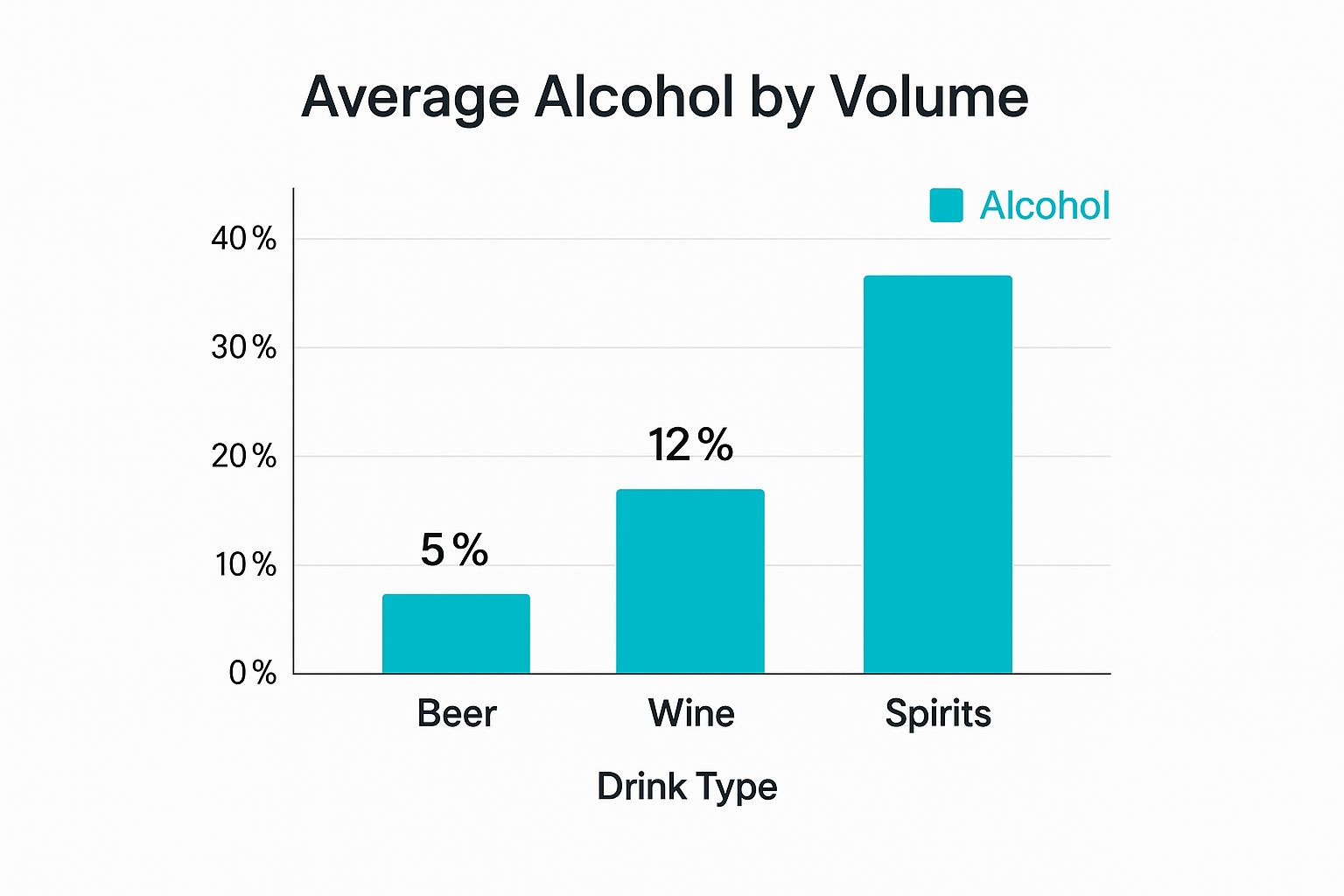
When you realize that a single shot of spirits has the same alcohol as a full beer, it really puts things into perspective. By understanding what’s in your glass, you can make smarter choices, significantly reduce the strain on your body, and wake up feeling much, much better.
How Vitamins and Supplements Can Help Prevent Hangovers
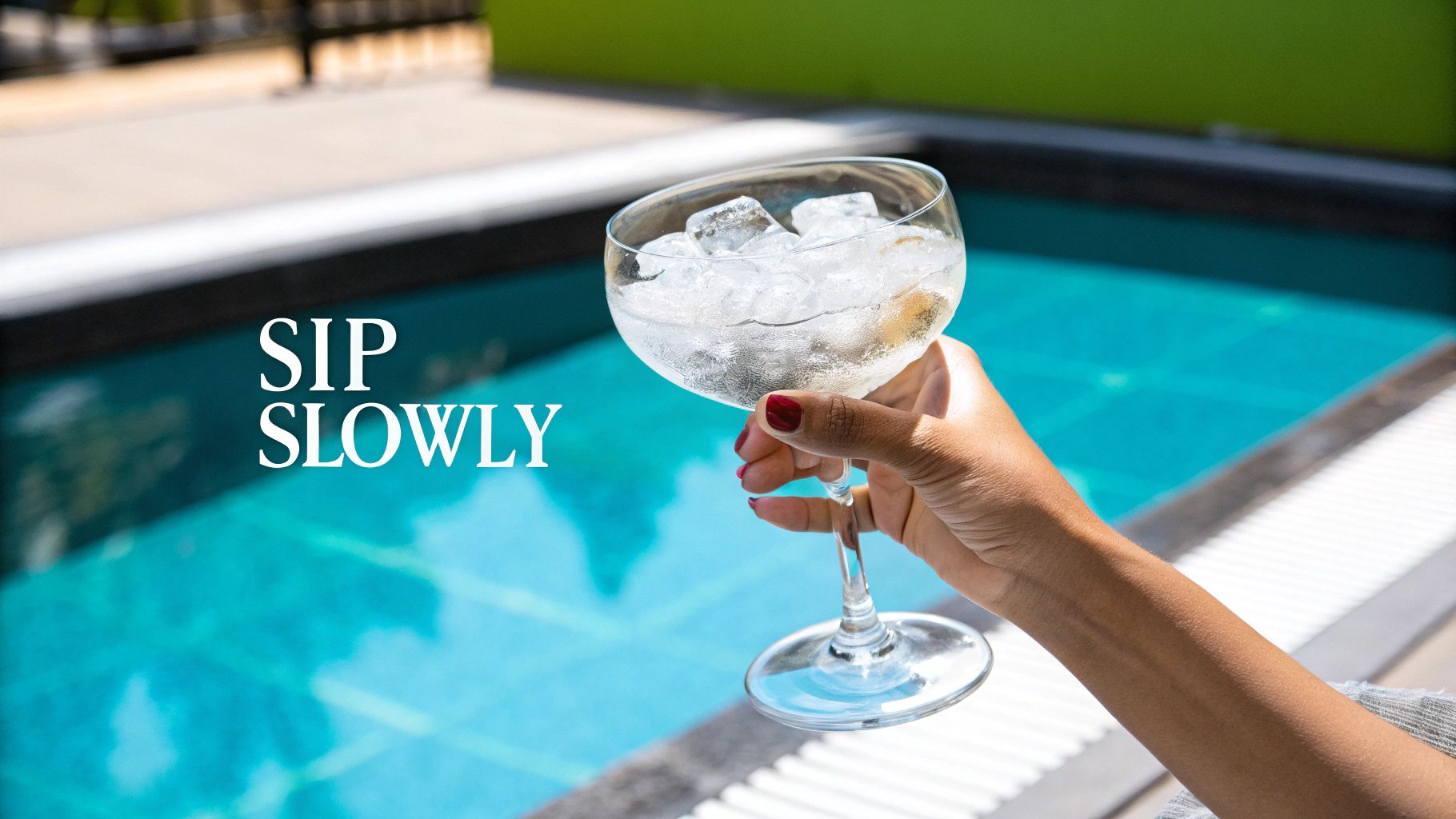
Smart hydration and strategic eating are a great first line of defense, but there’s one more layer you can add to your plan for a better morning. It’s what’s going on inside your body that really counts, and your nutrient levels play a huge role in how you bounce back after a night out.
Drinking asks a lot from your body, especially your liver. The process of breaking down alcohol is demanding work, and it burns through a ton of your body's essential vitamins and minerals. This nutrient drain is a sneaky but major reason we feel so foggy and run-down the next day.
Think of it this way: you wouldn't run a marathon without the right fuel. So why would you head into a night out without giving your body the tools it needs? Fortifying your system with the right supplements beforehand is a game-changer.
The Power of B-Vitamins and Antioxidants
When it comes to processing alcohol, B-vitamins are the real MVPs. This group of vitamins is absolutely essential for your metabolism, helping your body create energy and supporting the enzymes in your liver to do their job right.
The problem is, alcohol metabolism absolutely torches these crucial vitamins, especially B1 (thiamine) and B6. As these levels drop, your body struggles to efficiently break down alcohol and its toxic byproducts. That means those nasty compounds hang around longer, making you feel miserable.
Key Takeaway: Think of B-vitamins as the support crew for your liver. Stocking up in advance ensures your body's processing plant is fully staffed and ready to go, helping you sidestep that dreaded next-day sluggishness.
Antioxidants like Vitamin C are just as important. When your body breaks down alcohol, it creates a highly toxic compound called acetaldehyde, which causes a ton of oxidative stress. This damage is a major source of inflammation and many of those classic hangover symptoms we all know and hate.
Here's the quick breakdown:
- B-Vitamins: Help your liver metabolize alcohol more effectively while keeping your energy levels up.
- Vitamin C: Acts as a powerful antioxidant to help neutralize the harmful byproducts of drinking.
Research even shows that supplementing with Vitamin B6 before drinking can lower the severity of a hangover by as much as 30%. It’s a small step with a big impact.
Timing Your Supplements for Maximum Effect
When you take your supplements is just as important as what you take. You want to get ahead of the problem, not play catch-up the next morning.
The most effective strategy is to take a B-complex vitamin or a product like an Upside Hangover Stick—which is packed with these essential nutrients—before you even have your first drink.
This front-loading approach gives your body a surplus of these vital helpers right when it needs them most. It's a simple, proactive step to support your body from the inside out. For a complete playbook, check out our guide on how to prevent a hangover for more tips to make your next morning a whole lot better.
Got Questions About Hangovers? We’ve Got Answers.
Even when you have a solid game plan, there are a ton of myths and nagging questions that can throw a wrench in your efforts to wake up feeling human. Let's tackle some of the most common points of confusion so you can finally get the straight, science-backed answers you need.
Getting these details right is the difference between a productive morning and a day spent under the covers.
Should I Take a Painkiller Before Bed?
It feels like a genius move, right? Pop an Advil or Tylenol before crashing to get ahead of the inevitable headache. But this is one shortcut you absolutely want to skip. Mixing alcohol and certain painkillers can be a recipe for disaster, especially for your liver.
Your liver is already pulling a double shift to process all that alcohol. When you add a painkiller into the mix—especially acetaminophen (the stuff in Tylenol)—you're putting a ton of extra stress on it. This can seriously increase your risk of liver damage or inflammation. Nobody wants that.
Even NSAIDs like ibuprofen or naproxen aren't a great combo with booze. Alcohol already irritates your stomach lining, and so do NSAIDs. Taking them together can seriously ramp up the risk of stomach bleeding and other gnarly digestive issues.
Here’s the smarter play: Just wait until morning. See how you actually feel when you wake up. If you have a headache then, a painkiller will be much safer once most of the alcohol is out of your system. It’s just not worth the risk.
What About the "Hair of the Dog" Trick?
Ah, the infamous "hair of the dog that bit you." Having another drink the next morning is probably the most stubborn hangover myth out there. And while that morning mimosa might provide a brief moment of relief, you're just delaying the inevitable.
Drinking more alcohol doesn't cure your hangover; it just postpones it. It essentially tricks your brain into feeling better for a little while. But as soon as that new drink wears off, the original hangover comes roaring back, and often, it's even worse. You're just kicking the can down the road and putting your body through even more stress.
Why Is My Sleep So Awful After a Night Out?
Ever notice how you can pass out hard after a few drinks but still wake up feeling like you've been hit by a truck? That's because alcohol completely messes with your sleep quality. It particularly disrupts your REM (Rapid Eye Movement) sleep, which is the critical stage for feeling mentally restored.
Here’s the simple version of what’s happening in your brain:
- You fall asleep fast. Alcohol acts as a sedative at first, which is why you might conk out quickly.
- Then comes the rebound. As your body starts breaking down the alcohol, the sedative effect wears off. Your system jolts into a more alert state, causing you to wake up over and over again in the second half of the night.
- Less deep sleep. You end up getting way less of that deep, restorative REM sleep. This is why you feel so groggy and mentally foggy, no matter how many hours you were technically in bed.
This sleep disruption is a huge reason you feel so tired the next day. A good rule of thumb is to stop drinking at least two to three hours before you plan to hit the hay. Give your body a head start on processing the alcohol, and you’ll give yourself a much better shot at real rest.
Ready to stop strategizing and just enjoy your night? Upside has your back. Our Hangover Sticks are packed with the vitamins and minerals your body needs to process alcohol effectively, helping you wake up feeling refreshed and ready for your day. Keep one in your pocket and make your next night out a great one from start to finish. Find your solution at enjoyupside.com.
